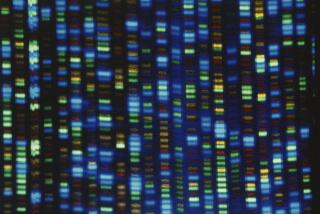Harvard to Make Stem Cells From Cloned Embryos
- Share via
Harvard University researchers announced an ambitious, privately funded plan Tuesday to create human stem cell lines from cloned embryos, an ethically charged endeavor that could yield treatments for diabetes, sickle cell anemia and other disorders.
The scientists said the stem cell lines, created in part from DNA taken from sick patients, would also enable them to observe how diseases developed at the earliest stages of human life -- long before symptoms were evident.
“We hope to move the study from patients to the petri dish,” said Dr. Douglas Melton, whose research shifted to Type-1 diabetes several years ago when both of his children were diagnosed with the disease.
Embryonic stem cells are master cells that give rise to every tissue type in the human body. Researchers worldwide are hoping to harness them to produce replacement tissues for patients suffering from a variety of afflictions in which tissues die.
The Harvard scientists, joined by researchers at Columbia University in New York, will use private donations to circumvent the Bush administration’s ban on the use of federal funds to produce new stem cell lines.
The first step is creating cloned embryos and extracting stem cells from them. A South Korean scientist claimed to have done that almost two years ago, but his work was exposed as a fraud.
Noting that the Korean fiasco will put their work under close scrutiny, the Harvard scientists said they had crafted safeguards to ensure that their results were authentic and that human subjects were treated ethically.
The work has been approved by institutional reviews at Harvard, two affiliated hospitals and a fertility clinic. A review panel at Columbia University also approved it.
So far, no other institution has reported producing a stem cell line from cloned embryos, and the Harvard scientists said it could be years before they showed results.
“This research is very much in its infancy, and clinical applications could be a decade or more in the future,” said Dr. George Daley, associate director of the Boston Children’s Hospital stem cell program. Daley was one of several scientists who briefed reporters over a telephone link.
Elsewhere, scientists have begun similar work. Researchers at UC San Francisco are studying human eggs in preparation for cloning experiments, a spokeswoman said Tuesday. Also, an institute in the United Kingdom reported success in creating a cloned blastocyst -- an early embryo -- but not in producing a stem cell line from it.
The Harvard program is not likely to rest well with religious conservatives, who object to embryonic stem cell research in general because it requires the destruction of embryos they regard as human life.
Cloning research is even more contentious because it raises the possibility that embryos could be raised to create an exact replica of a person. But scientists across academia have steadfastly denied that they intend to do so.
So far, scientists have derived stem cells from surplus embryos donated by couples treated at in-vitro fertilization clinics.
These cells, however, stand a good chance of being rejected if transplanted into unrelated patients.
Many scientists believe that compatible stem cells can be derived from cloned embryos made by joining a patient’s own DNA with a donated egg emptied of its genetic contents.
In theory, the resulting stem cells would be accepted once they were implanted back into the patient, since they would be a perfect genetic match.
More to Read
Sign up for Essential California
The most important California stories and recommendations in your inbox every morning.
You may occasionally receive promotional content from the Los Angeles Times.












